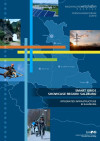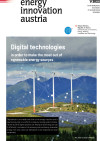Suchergebnisse für "Factsheet: Energietechnologien gestalten, die für alle sinnvoll und nutzbar sind"
openBAM - Open Building Automation Modelling - Open modeling of building automation over the entire building life cycle
Platform-independent modeling of control and regulation logic for detailed study of building automation systems involving construction and building technology. The result enables the analysis of energy saving potentials through building automation before construction.
Climate protection in Schools: a prototype for targeted oriented knowledge transfer for students on the basis of energy efficient buildings
The saying "Was Hänschen nicht lernt, lernt Hans nimmermehr." which can be translated with the English saying "You can´t teach an old dog new tricks." especially applies to the issue of "climate protection" in general. Therefore children must be made aware of the importance of the subject from the beginning on in order to live their life efficiently and environmentally friendly. Based on a research and on an evaluation of existing teaching materials teachers and students will develop, how students understand the topic "climate protection" with a focus on "building and living in the future" the easiest way.
Mission Innovation Austria Online Event: Energy Communities - Findings from Innovation Programs and Pilots
23. April 2020
Online
The aim of the half-day webinar was to provide insights into energy communities and their opportunities and challenges arising from current market and regulatory regimes. More than 300 participants from 28 countries took part in the webinar.
Development of a Window for Passive-Housing Featuring an Integrated Sun Shield

Development of a laminated wooden/aluminum window for a passive-housing featuring an integrated sun shield in the shape of blinds or of folding net curtain.
Pathways to sustainable construction. Experiences and prospective European research strategies

The aim of this study is to investigate the international research context of the programme "Building of Tomorrow" (with a focus on central, eastern and southern European countries) and to identify co-operation potentials.
Smart ABC Smart Energy Efficient Active Buildings and Building Clusters
The EPBD recast 2010 targeted "nearly zero energy buildings". This low amount of energy is to be covered by energy from renewable energy sources. The project "Smart ABC" analysed a variety of relevant solution sets regarding the building performance and the renewable based energy supply options. Energetic and ecological impacts were analyzed in order to optimize the integration of renewable energy technologies in building standards and to find answers how to depict a building cluster regarding standards and tools.
Indicators for urban areas – for construction, operation and mobility in climate-friendly areas
Development and coordination of indicators for energy and ecological evaluations of urban areas based on the Swiss 2000-Watt certification system. The results will be used for the development of a quality assurance system for urban areas similar to the klimaaktiv declaration for buildings and the e5 certification for communities.
Smart Grids Showcase Region: Salzburg

Integratred Infrastructure in Salzburg
Forschungsforum
2/2010
Herausgeber: BMVIT
Englisch, 6 Seiten
Downloads zur Publikation
Building of Tomorrow for the construction industry
Dissemination of results of the research initiative "Building of tomorrow" for two specific target groups - master builder and installer - implementation in further vocational training concepts
Digital technologies

Digital technologies in order to make the most out of renewable energy sources.
energy innovation austria
1/2022
Herausgeber: BMK in cooperation with the Climate and Energy Fund
Englisch, 12 Seiten
Downloads zur Publikation
Sustainable ventilation systems in multi story residential buildings in the conflict areas of hygiene and costs
The goal of this project was to develop guidelines for hygienic and cost-efficient mechanical ventilation systems in residential buildings, in which maintenance and cleaning demands are described. These guidelines are based on existing literature as well as practical experience of the property owners, finally they are based on results of hygienic measurements in existing ventilation systems conducted in this research project.
Biotope City - construction manual for the green city of the future
"Biotope City" is an overall concept for the implementation of comprehensive urban greening with the aim of using the regenerative mechanisms of nature. With this approach, quality of life is to be comprehensively, sustainably and cost-effectively increased and resilience against extreme weather events in cities will be improved. The project aims to generate realistic components of a "construction manual" for the green city of the future, which are generalizable and transferable.
Practice Guide for Sustainable Building Sanitation and Modernisation within Construction Intents

A checklist considering priority, construction progress and actors is elaborated to serve a future-oriented selection of materials, energy carriers, design and construction within building sanitation, under a deliberate consideration of the involved actors from the construction branch
win wi[e]n: block development ground floor zone: Optimization of the Viennese block renewal programm as a tool for a sustainable development of street level and open (public) spaces of urban fabric
Development of the Viennese Block Renewal Program with a special focus on the ground floor zone of historical urban fabric (on the basis of the case study Block Renewal Area Ilgplatz, Vienna): sustainable restructuring and reusing of the blocks at ground level, including courtyards and street spaces- as a comprehensive planning approach.
ZERMET - Zero Emission Retrofitting For Existing Textile Plants
Minimisation of the consumption of water, chemicals and energy in the textile industry. Further development of the ZERMEG approach in the form of a questionnaire and application in the textile industry.
NEBKrit - Quality criteria for buildings and neighbourhoods on the basis of the New European Bauhaus
Develop criteria of aesthetics and social inclusion based on the values of the New European Bauhaus to complement existing sustainability criteria in order to evaluate buildings and neighbourhoods more broadly. Since todayʼs necessary transformation of the economy always includes cultural and social aspects, such a broader assessment makes more sense than todayʼs usual methods.
ERSCP 2021 - European Roundtable on Sustainable Consumption and Production
8. - 10. September 2021
Graz
ERSCP21 will consider the possibilities to reduce the emission of climate-relevant gases during production as well as to reduce upstream emissions by changing consumer behavior. The topics discussed at the conference cover a number of UN Sustainable Development Goals.
EnergyCityConcepts - Methods and concepts for the implementation of sustainable energy systems in cities
Two concrete model regions (small city Gleisdorf and urban city quarter Salzburg-Schallmoos) will be developed and tested using new methodical approaches (interdisciplinary urban and regional energy planning, modeling and simulation). Therefore, it is aimed to substantiate scenarios and concepts for the implementation of defined targets on technical, ecological and economic criteria.
GreenDeal4Real - Improving the thermal comfort in mixed-use areas through cost-effective green infrastructure
The aim of the project is to avoid overheating in summer by using innovative greening measures in the mixed residential and commercial area Aspernstraße/Lavaterstraße. The development of a guideline should facilitate the realisation of climate-sensitive projects from strategy to actual implementation and ensure a high degree of transferability to other areas.
SmartCity Baumgarten - Demonstration of an anergy network and implementation of climate-friendly solutions in existing districts
Implementation of a cross-property anergy network for the supply of heating, cooling and electricity in an existing neighbourhood. With this demonstration project, a technical-legal alternative for areas outside of district heating supply is developed, which makes it possible for neighbourhoods to join together to use renewable energies in common.
